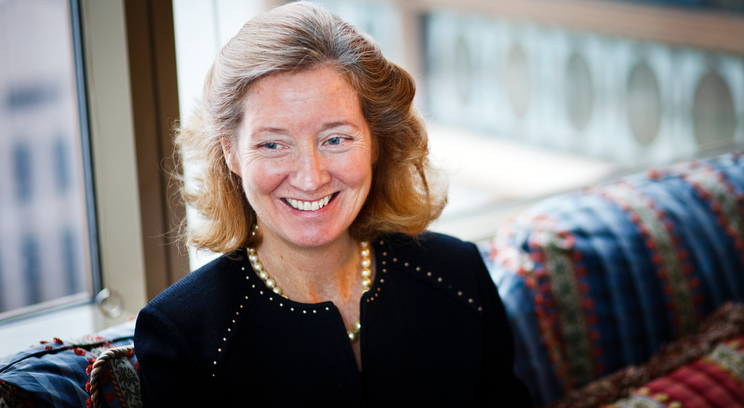Marianne Short considers herself fortunate to have been counseled by brilliant lawyers and wise judges throughout her career, but she believes the best advice she ever received was from her father when she was a child – and it had little to do with her chosen profession.
“My father used to say to us kids, ‘Reach for the stars, and if you end up at the moon, you’ll be happy,’” she said. “We were disciplined, and we pushed each other. We knew that nothing was beyond our reach if we worked hard enough.”
And work hard is what Short always has done – as a young associate in a big law firm, as a judge on the Minnesota Court of Appeals, as managing partner of the same law firm and now as chief legal officer for UnitedHealth Group.
But she waves off praise from peers and credits Marion and the late Robert Short with providing an invaluable foundation for her and her six siblings, four of whom also have law degrees.
“There was no larger influence in my life than my parents,” she said. “They instilled a sense of family and faith and discipline. I credit any modicum of success to them.”
Short grew up in Edina. Her dad owned several businesses, including a trucking company, the Leamington Hotel, the Minneapolis (now Los Angeles) Lakers and the Washington Senators (now Texas Rangers), and he ran for the U.S. Senate in 1978.
“As children we were always involved with my father and his cronies,” she said. “It didn’t make any difference if you were 10 or 16, you would sit and listen to or talk about current issues. Those experiences really made us think.”
Marion Short remembers her daughter as the ultimate planner and “the most-organized person in the world.” When the Shorts moved during Marianne’s childhood, “she started planning neighborhood parties to meet the other kids,” Marion said. “You can be a success at anything if you’re a take-charge person, and that was Marianne.”
As a high school student at Visitation in Mendota Heights, she was founding editor of First Edition, the school newspaper. She covered the 1968 presidential election party at the Leamington for Hubert Humphrey, a family friend, who lost a close race to Richard Nixon.
“I just walked around and took notes like a regular reporter might do, on the atmosphere and mood,” she said. “It was exciting, but there was sadness, too,” and her story was headlined, “The Last Hurrah of HHH.”
Short enrolled at Newton College of the Sacred Heart in Boston at the encouragement of Visitation’s Sister Perone Marie, who had taught there during her novice years. Short majored in political science and philosophy, graduated in 1973 and earned a law degree three years later from Boston College. She returned home to spend 18 months as a state assistant attorney general before moving to Dorsey & Whitney, a Minneapolis-based law firm.
“I wanted to learn from the best on how to prepare for and try cases,” she said. “The best thing about (Dorsey & Whitney) is the depth in all practice groups and the expertise within the walls. I could walk down the hall and get help on just about anything.”
Short found her childhood experiences invaluable, too, as she matured in the job and handled banking, securities and employment law cases.
“I always wanted to be a litigator,” she said. “I liked the courtroom drama and the challenge of putting together a case for a jury. Part of that was my upbringing with my siblings, battling things out at the dining room table. They taught me well, too.”
Gov. Rudy Perpich appointed Short, at age 37, to the Minnesota Court of Appeals in 1988. She decided to take the job because she felt it would provide her with a regular work schedule and a better work-family balance as the mother of two young sons.
“I had some hesitation,” she said. “I worried it might be like going to study hall because it would be too quiet. The biggest surprise was no busy signal on my phone, where I could put people on hold. I thought, ‘How will I ever work here?’ I discovered that people don’t call judges; rather, you walk down the hall for conversation with your colleagues.”
Short grew to love the job, writing 900 opinions in 12 years, and she came to appreciate the impact that the court has on people’s lives. “You don’t take that responsibility lightly,” she said.
But as she turned 50 and her sons headed to college and high school, she felt a need for change and returned to Dorsey & Whitney in 2000. Her work focused on health care law, with clients such as Medica, UnitedHealth and Blue Cross Blue Shield.
“Quite honestly, she was a stronger lawyer when she came back,” said Bill Berens, a 1975 St. Thomas alumnus with Dorsey & Whitney since 1978. “Her experience on the bench gave her insight into the practice of the firm, and from a different perspective.”
Seven years later, Short faced another big decision – whether to become the first woman to serve as managing partner of Dorsey & Whitney, then Minnesota’s largest firm with 600 attorneys in 19 offices around the world.
“It was a huge honor to be asked, but I didn’t want to give up my practice,” she said. She worked out a blended schedule – two-thirds management and one-third practice – and enjoyed it because “it kept me relevant to clients. Part of the job was managing and making strategic decisions on the direction of the firm, but I also needed to be responsive to clients.”
Much of Short’s tenure came during the recession, which forced her to deal with cost-cutting issues and adding value to services provided to clients. Another opportunity
involved the constant need to nurture attorneys and strengthen their engagement to private practice.
“Our talent walks out the door every night, and we have to make certain they come back every day,” she said. “Practices need to connect the next generation of lawyers to the firm and to our clients.”
Short had special appreciation for Dorsey & Whitney’s culture and three core values: clients (“we are committed to them”), colleagues (“we like and respect each other”) and community (“we give back”).
She has long given back personally through her service on numerous boards, including Boston College, where she has been a trustee on and off since 1985 and today is chair of the Student Life Committee. Father William Leahy, president since 1996, values her balance.
“That comes out of her training as a lawyer and jurist,” he said, “but there truly is a judiciousness in her observations and judgments. She’s a voice of wisdom.”
As satisfied as Short was at Dorsey & Whitney, she accepted an offer to join UnitedHealth as its chief legal officer in January. She was reluctant to leave the firm but believed it was time to try something different.
“You always hate to leave a group you’ve worked with for so long – the people who helped you grow as a lawyer and a leader,” she said. “Not that you ever get comfortable with any job, but there is something about new opportunities that keeps you fresh and takes you out of your comfort zone.”
Along the way, she said, she still finds herself following her dad’s advice. “I don’t know if it’s the stars or the moons,” she said, “but I’m still reaching.”
Read more from St. Thomas Magazine.







